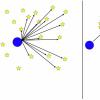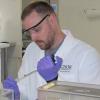dlewis1453, thank you for replying!
Yes, it was somewhat unexpected that CRISPR gene editing might not easily add substantial IQ with a few edits.
However, there are a number of high value edits that might be considered in the future.
For example, there is an edit in the APP gene that could almost ensure that Alzheimer's would never develop.
There are also edits for heart disease and many other illnesses that have very large effects on disease risk.
A few of these edits could create a profoundly more adaptive human.
One problem that I see with the anti-eugenic stance is that it really does not have plausibility over the long haul.
If you remove most of the Darwinian selectors from life, then you have this expectation that in time there will be
more and more disability accumulating in the community. What you then have seen as a response are periodic genocidal rages against
people who might have multiple generations affected by various illnesses.
From my vantage point, I see this disregard of the causality of genetics to phenotype and then to a possible social response
to be highly immoral. It really should not be too much to expect from people that they have some awareness of the type of community
resources that they are consuming and to adjust their fertility and consider embryo selection etc. if needed. Not doing so simply
creates the potential energy for genocidal behavior.
Yet, it is so easy to prevent all of that. Simply selecting at the level of 1 in 10 every few generations would eliminate an eternity
of bloodlines with known genetic risks. It would effectively defuse the genocidal impulse. Indeed with 1 in 10 selection, it would
make many with such tendencies uncomfortable as most without such selection would not pass such a standard themselves.
It would seem to me to be highly unethical to make people believe that any possible genetic recombination is perfectly acceptable.
That is not realistic. Giving people better guidance into the possible rewards and punishments that likely will occur to specific
genotypes would help create healthier communities. It seems to me to shout about the horrors of genocide while knowing full well
that simply allowing the genetic roulette wheel to operate randomly will create enormous social pressure over time is wrong.
In terms of the actual mechanics involved in genetic engineering, it would seem the tech has already arrived. Published peer reviewed
research claimed a 2.5 IQ point genetic enhancement using 1 in 10 embryo selection without aggressive mate selection. So, we know that
IQ can be enhanced with embryo selection. The actual magnitude is probably now in a great deal of motion. What happens when there
is one in a million level selection and the chromosomal polygenic scores are carefully matched. There are a variety of potential ways
that you noted that could greatly amplify genetic enhancement including in vitro gametogenesis. It does not seem unlikely that
profound genetic enhancement of IQ and other traits is on the horizon.
One approach that I have thought to be of interest is to select mates based upon matching polygenic chromosome scores. So, if a couple
both had at least 1 strong polygenic score for chromosomes 1, 2, and 3, then the resulting offspring could be selected to have homozygous
strong polygenic scores for chromosomes 1, 2 and 3. The next generation would involve mating those with these fixed chromosomes 1, 2, and 3
and perhaps then also fix chromosomes 4,5, 6, and 7. After each chromosome were "fixed" all succeeding generations would be assured of
receiving a strong chromosome from each of their parents. After 4 or 5 generations of this strategy, the entire genome would become fixed
to high ability/functioning. Organizing the genome in this way would guarantee a near continuous uplift in the each new generation. The effect
would become all the more powerful as the entire community joined in.
Such an approach has never been tried before. Until the polygenic unlock of the human genome, all people had to go on was phenotype.
Phenotype is a remarkably ineffective way of achieving genetic enhancement. You noted the polygenic nature of human traits, well such
polygenics then make it nearly impossible to create a shift in phenotypes. The attempts over thousands of years to uplift humanity in that
way have largely failed. The thinking behind -- that girl looks smart and that boy looks smart -- and their children will also be smart is truly
abysmal in light of today's knowledge. One could clearly imagine scenarios in which a girl that did not look that smart and a boy that did not
look that smart had children that were super-smart and this could be by design and not by luck. Genotype now dominates phenotype. Thinking
in terms of phenotype is no longer that bright.
With the chromosomal organization approach outlined above, the uplift over even a century would likely be very large. It is actually
quite remarkable to realize how much power low level embryo selection, combined with polygenic scores combined with strong mate selection
could have on human IQ etc..
My impression is that IQ will over the medium term no longer be seen as a limiting factor. There might be surprisingly little reward for being
high IQ in our future world. It will be more than possible to create 250 IQ people at will. Supply and demand. It is not difficult to see that
those with 250 IQ might be the bottom of our future society. Yet, I also could see that in a world of IQ abundance that there could be much more
indifference about cognitive ability. People could simply accept others as they are and not have some grudge that they aren't somehow better.
If we can solve all of our problems easily with enhanced IQ people and with GPT, then why sweat it?
However, the problem now is that we do not really have that luxury. We do have pressing problems to solve and we are in this downward psychometric
cycle and it is not easy to see how we can get out of this hole even in the 21st century without some fancy genetic help. In a down cycle all sorts of nasty
things become possible. You are on that sinking boat and the resources are being constantly constrained. Turning that situation around with genetic
selection etc. would then represent a very positive change for the better. The boat would no longer be sinking but rising up.




















































